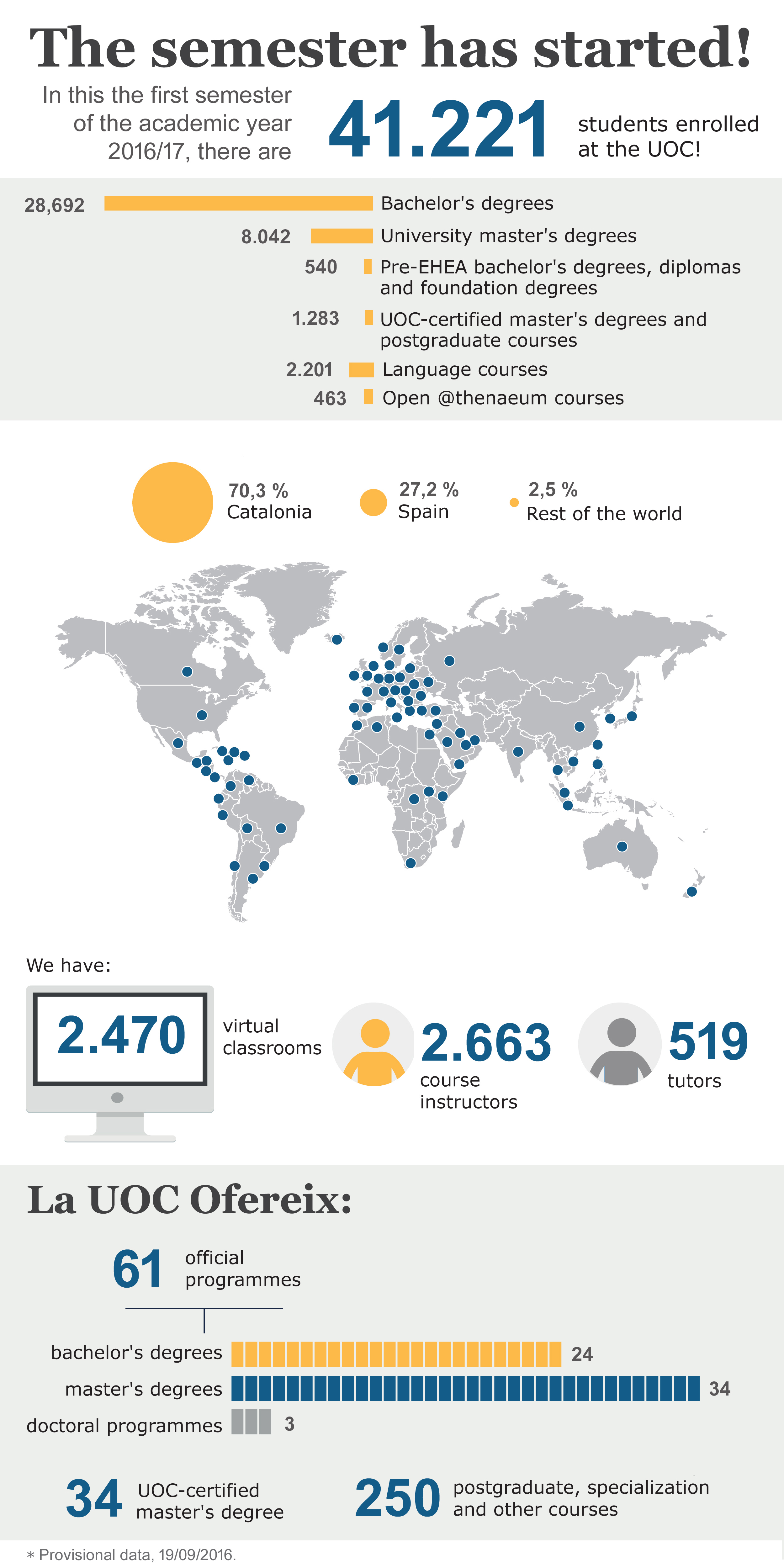The new academic year starts with over 37,200 students
This Wednesday, 21 September, marks the start of the new academic year at the UOC, with 28,692 bachelor's degree and 8,042 university master's degree students – 6.3% more than last year. The most popular programme is the bachelor's degree in Psychology, followed by Business Administration and Management, Law, and Computer Engineering, in line with the trend of recent years. Over 10,000 of the enrolments are people studying for the first time at the UOC.
With regard to the rest of Spain, of note is the number of people studying university master's degrees (1,756), an increase of 133% with respect to the previous year. The most popular university master's degrees are those in Learning Difficulties and Language Disorders; Legal Practice; ICT Security; Education and ICT; Health and Safety, and Nutrition and Health.
When it comes to language courses, 2,200 people have chosen the UOC to help them learn or increase their knowledge of a language. The most popular courses are for English, with 1,641 people enrolling, followed by French, German, Catalan, Japanese and Chinese.
This academic year the UOC is offering 24 bachelor's degrees, 34 university master's degree, 3 doctoral degrees, 34 UOC-certified master's degrees and 250 postgraduate, specialization and short diploma courses.
New students
Of the more than 10,000 people who are starting at the UOC for the first time, most have chosen to do so on the bachelor's degree in Psychology, the university master's degree in Learning Difficulties and Language Disorders, and the bachelor's degrees in Business Administration and Management, Computer Engineering, and Law.
What is a typical UOC student like?
UOC students combine their studies with work in 80% of cases, and 70% have a previous university qualification. They choose the UOC because it is innovative and lets them manage their time better.
How do you study at the UOC?
Students learn actively, with constant support from the 3,700 teachers. They learn in collaboration with their classmates and with support from tools and resources. Assessment is based on competencies. The educational model focuses on participation and collective knowledge-building, and welcomes students’ past experiences in work, social areas and education. Some of the methods used to promote collaborative learning include project-based learning, problem-based learning, enquiry-based learning and agile methodologies.
Internships and mobility
UOC students have access to the Internships and Mobility Service. Internships are available at companies and institutions in Spain and further afield, and can be carried out in person, online or combining both systems. The UOC also promotes academic mobility not only for its students but also for its teaching and administrative staff. It does so by providing a range of support services, grants and aid, enabling them to undertake part of their learning, practice or professional activity at another university, company or institution during their time studying or working at the UOC.
Nearly 68,500 graduates connecting with 20,000 companies
The UOC is the leading online university in Spain in terms of graduates, with 68,479 spread around 80 countries all over the world. As can be seen in the evaluation report produced by the University's Planning and Quality department, there are high levels of satisfaction with their studies. Among the results, highlights include the fact that 92% would choose to study at the UOC again and 88% would repeat the same course if they had to study again.
It is worth remembering that the UOC has two semester start dates: 21 September and 19 October, so the number of students enrolling will continue to rise over the coming weeks.
* data as of 19 September
Press contact
-
Editorial department

